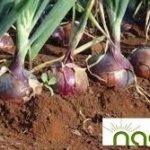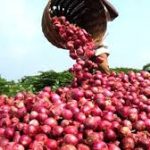The National Onion Producers, Processors, and Marketers Association of Nigeria (NOPPMAN) has issued a stark warning that onion farmers in the country are grappling with over 50% post-harvest losses due to escalating production costs, inadequate storage infrastructure, and the growing impact of climate change. Alhaji Aliyu Maitasamu, President of NOPPMAN and the Regional Observatory of Onion Sector in West and Central Africa (ROO/WCA), revealed these challenges in a recent press conference in Sokoto, urging for immediate intervention from all relevant stakeholders.
Rising Costs and Shrinking Production Capacity
Maitasamu explained that the surge in production costs is the primary factor threatening the sustainability of onion farming in Nigeria. The prices of onion seedlings, which are essential for planting, have hit unprecedented levels in recent months. This has significantly impacted farmers’ ability to maintain their production levels, raising serious concerns about the future of onion farming in the country. “The increasing cost of seedlings and farm inputs has become a huge burden for farmers. If we cannot afford to plant, our production will fall, prices will rise, and ultimately, food security will be at risk,” Maitasamu said.
This alarming trend is not only putting financial pressure on farmers but is also discouraging new investments and reducing the capacity of existing farms to expand. Without affordability and access to necessary resources, the future of Nigeria’s onion production looks uncertain, potentially leading to higher food prices and shortages.
Post-Harvest Losses: A Major Concern
NOPPMAN has reported that over half of Nigeria’s onion production is wasted after harvest due to poor storage facilities, lack of advanced preservation technology, and unreliable transportation systems. These factors contribute to significant losses that undermine farmers’ profitability and leave a large portion of the harvest unused. “More than half of our onion harvest is lost after picking, and this loss directly impacts our economy and the livelihoods of farmers,” Maitasamu stated.
The failure to preserve onions after harvest exacerbates the economic challenges already faced by farmers, with many unable to sell or use their crops before they spoil. This results in both direct financial losses and a disruption of the supply chain, which affects market prices and availability.
Inflation and its Impact on Onion Farming
Inflation has compounded the challenges faced by onion farmers in Nigeria. The rising costs of fertilizers, pesticides, fuel, and labor have made it increasingly difficult for farmers to break even, let alone expand their operations or invest in modern agricultural technologies. Maitasamu pointed out that many farmers are struggling just to maintain their current operations, with little opportunity for growth or innovation. “The financial pressure on farmers is immense, and this limits their ability to invest in improvements or expand their farming capacity,” he explained.
This ongoing financial strain has resulted in a decline in the overall productivity of onion farms, as farmers are forced to scale back their operations due to the rising costs of essential inputs.
Climate Change: A Growing Threat to Onion Farming
Maitasamu also highlighted the adverse effects of climate change on onion production. Unpredictable weather patterns, extended rainy seasons, and extreme temperature variations have disrupted traditional farming cycles, making it increasingly difficult for farmers to predict and manage their harvests. These weather changes also increase the vulnerability of crops to diseases, pests, and waterlogging, further compromising the quality and quantity of the harvest.
“The weather is no longer predictable. Our farmers now face challenges of extended rains and erratic temperatures, which lead to poor harvests, crop diseases, and waterlogging,” Maitasamu said. These unpredictable conditions disrupt planting and harvesting schedules, making it harder for farmers to plan their operations effectively.
Call for Urgent Action and Collaboration
In light of these challenges, Maitasamu has called on the Nigerian government, financial institutions, development partners, and the private sector to come together and support the onion farming sector through policy reforms, financial aid, and investments in infrastructure. He emphasized the need for improved storage facilities, better transportation networks, and advanced preservation technologies to reduce post-harvest losses and ensure the sustainability of the onion industry.
Furthermore, Maitasamu stressed that there needs to be a more coordinated approach to addressing the various issues that onion farmers face. This includes better access to affordable farm inputs, support for climate-resilient farming practices, and greater investment in rural infrastructure. By taking these steps, he believes the government and other stakeholders can safeguard the livelihoods of farmers and help stabilize Nigeria’s food supply chain.
Securing the Future of Onion Farming
As the onion sector remains a key part of Nigeria’s agricultural economy, it is crucial to implement measures that will not only protect the livelihoods of farmers but also ensure that the country can meet its domestic onion needs without relying heavily on imports. With Nigeria’s population growing rapidly, the demand for onions and other staple crops will only increase, making it essential to address these challenges swiftly to avoid further disruptions in production.
Maitasamu concluded his remarks by stressing the need for urgent and sustained support for the onion sector, noting that without decisive action, the industry could face long-term instability, impacting the broader economy and food security in Nigeria and the region.










